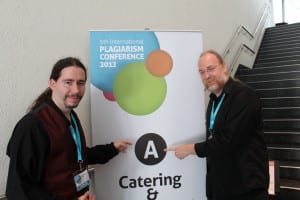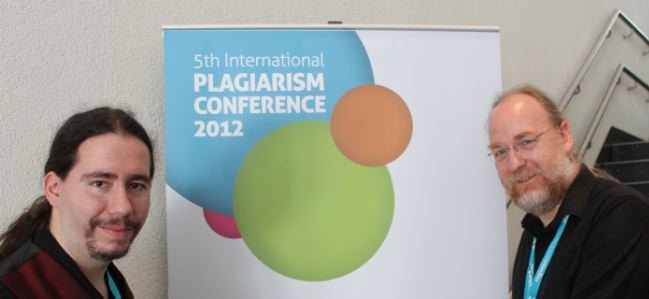5 Key Takeaways from the 5th International Plagiarism Conference

However, I did want to go over some of the bigger takeaways that I got from the conference and how I intend to apply them moving forward.
I don’t now how many of these takeaways were intentional, some of them came more from talking with others at the event between sessions and during breaks than from any of the talks. However, they are definitely the things I’ve found myself thinking about in the days since it ended.
With that in mind, here are my five takeaways, in no particular order (other than they sound good to me in this order).
1. The Role of Technology is Changing in Academic Plagiarism
When I was at the 3rd International Plagiarism Conference four years ago, many still viewed Turnitin as a tool to catch plagiarists and nothing more. Representatives from Turnitin, including Dr. John Barrie himself, struggled to counter that perception.
This time around, it was very different. All of the talk, literally from the welcome speech, was about “holistic” solutions and integrating originality detection software deeper into the feedback process, making it part of the grading and refining process, not just a tool to catch cheaters.
The idea, by in large, is to teach students about how to avoid being accused of plagiarism and how to create good research. This idea was popular and received warm welcome both in various sessions and, particularly in Dr. Tara Brabazon’s keynote at the beginning of the second day.
Attitudes seem to have shifted, at least among this group, and there’s a lot more emphasis on treating the root of the problem that causes plagiarism rather than merely dealing with the symptoms.
2. The Technology is getting Better
 However, just because the role of the tech is changing doesn’t mean that it’s not still being improved. Earlier this year iParadigms, the makers of Turnitin, introduced translated plagiarism detection and one of the workshops at the conference focused on a group of researchers from Hungary that may have developed an even better approach to solving the problem (something I will be testing soon).
However, just because the role of the tech is changing doesn’t mean that it’s not still being improved. Earlier this year iParadigms, the makers of Turnitin, introduced translated plagiarism detection and one of the workshops at the conference focused on a group of researchers from Hungary that may have developed an even better approach to solving the problem (something I will be testing soon).
It’s clear from the talks and sessions that the tech behind text matching and “plagiarism detection” is improving constantly, including speed, accuracy and ease of use, even if many of the advancements have been subtle.
That being said, there’s still clearly a great deal of room for improvement, in particular on the international front. The one workshop that discussed the accuracy of various plagiarism detection systems found that, in the use case of a Swedish university, even the best system missed about one half of its matches.
In short, the quest to improve originality checking is progressing but is far from complete.
3. Collusion is the Elephant in the Room
If you want to throw a grenade into a room of people talking about academic plagiarism, shout the world “Collusion” and be prepared to run away.
Collusion was repeatedly called the “Elephant in the Room” at the conference and with good reason. Where traditional plagiarism has a perpetrator and a victim, collusion gets much more complex. Not only are students encouraged to work together and help each other, making the boundary between legitimate assistance and collusion difficult to nail down, almost requiring it to be dealt with on an assignment by assignment basis.
But even with the grayer gray areas of collusion there are still bigger problems. You have to determine if the two students worked together, making them both guilty, or if one simply copied from the other. While it’s nice to have both students involved live and in front of you, that doesn’t always make things easier.
Worse still, as the one workshop on collusion pointed out, students are less clear about the rules surrounding collusion as one case study pointed out, a girl who was accused and penalized for collusion didn’t learn how to be a better student, but instead decided she would never work with or help another student again to be safe, even in group projects.
Collusion is the elephant in the room at these conferences and a problem that is not going away.
4. More Consistent Penalties Still Needed
One of the other great overarching concerns at the conference was the inequality in penalties from case to case, school to school and country to country. It’s clear that two students can commit largely the same offense but receive wildly different punishments depending on a million factors unrelated to the actual deed.
There was a lot of good progress made at the conference including a workshop on a plagiarism tariff (tariff in the “schedule of fees” sense of the word) that standardizes punishments. In a test of it looking at past cases, they generally found that schools metered our punishments similarly to what the tariff would and that the differences were because the punishments that were issued were not in the tariff.
Still, there is a lot of concern about how different students are treated but any talk about setting up an international standard is usually beaten down pretty quickly saying that there is first a need to focus on consistency within schools and within regions.
5. No One Wanted to Be a Plagiarism Expert
Finally, as I walked around and talked to people, one of my favorite questions to ask was simply: “How did you get into dealing with plagiarism?”
Everyone had a story, none of them good. Without fail, every single person was either forced into it by their employer or, most commonly, they were driven into it by a negative experience. Either they had noticed plagiarism issues in their classroom, (like me) had their works plagiarized or simply felt that academia was not doing enough to address the issue.
Pretty much no one wanted to be the plagiarism person and many were actively looking for a way out of it. While everyone was happy to be there, both in Newcastle and among colleagues, there was a general feeling that this was an ugly business and not what anyone wanted to be doing.
Teachers wanted to teach their subjects, programmers wanted to program other things and administrators wanted to focus on different areas of education.
In short, for no one, not even me, was plagiarism a first choice of a career. But it was a necessary one and one that we were all very driven to deal with in the best way possible.
Personal Aside
 While I was in the UK, I was given a few days to knock around and see some of the sights. Needless to say, this was a wonderful time filled with lots of trips to castles, cathedrals and more than my fair share of British food. However, there were a few things I did and spotted while I was out there that may be relevant to PT readers.
While I was in the UK, I was given a few days to knock around and see some of the sights. Needless to say, this was a wonderful time filled with lots of trips to castles, cathedrals and more than my fair share of British food. However, there were a few things I did and spotted while I was out there that may be relevant to PT readers.
First, many of you will remember my write up about the Band Sorry for Nothing and their licensing strategy that put their song “Swallow Your Soul” in front of thousands of video gamers. Well, my trip timed out with a concert Sorry for Nothing performed in nearby Ashington so I hopped on a bus to see them and got to hang out with them for a while afterward.
To the left a quick photo Crystal snapped of me hanging out with them, wearing the shirt they were nice enough to give me.
 Second, some of you might also recall the article I wrote detailing the strange case of Dennis the Menace and how two characters with the same name were launched, one in the U.S. and one in the UK, on the exact same day. It was a bizarre case that showed sometimes what one sees as plagiarism can be just an amazing coincidence.
Second, some of you might also recall the article I wrote detailing the strange case of Dennis the Menace and how two characters with the same name were launched, one in the U.S. and one in the UK, on the exact same day. It was a bizarre case that showed sometimes what one sees as plagiarism can be just an amazing coincidence.
Well, I searched high and low in the UK for anything related to the UK version of the character and didn’t see anything, that is, until I wandered into an indoor shopping fair in Durham. There, hanging from one of the stalls, was a stuffed animal of the character, pictured right.
So, while I was over there, I managed to find both Sorry for Nothing and Dennis the Menace. Granted, the first was much more important and much more awesome, but the second was welcome surprise too.
Bottom Line
All in all, there was so much learned and gleaned from this conference and this trip that I literally have post ideas for the next month.
I’ll be going into more detail on plagiarism tariffs, translated plagiarism detection, collusion and many of the topics that were focused on in Newcastle. But, also expect a little bit about castles other things learned while I was just hanging out.
In short, there’s a lot more to come here and it’s probably a good thing that it’s only once every two years. It might take me that long to cover all of the ground I picked up.
Want to Reuse or Republish this Content?
If you want to feature this article in your site, classroom or elsewhere, just let us know! We usually grant permission within 24 hours.
